Antibiotics for Dogs
Explore antibiotics for dogs to treat bacterial infections and help your dog recover from various health issues.
-
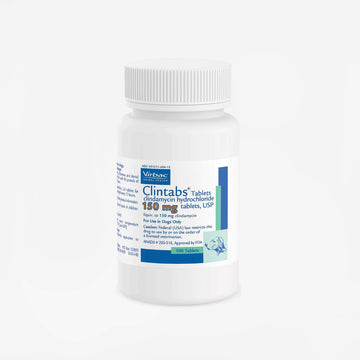
Clintabs (Clindamycin HCl) (Rx)
$0.69 / unit
Multiple options available
-
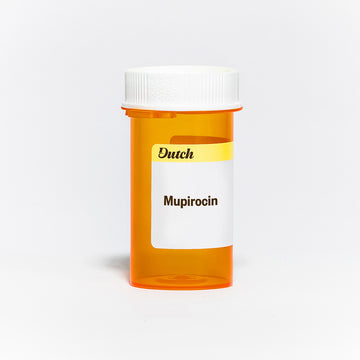
Mupirocin Ointment (Rx)
$14.50 / unit
Multiple options available
-
Prescriptions without the expensive vet trip
Video chat with a vet and get new prescriptions and renewals — shipped free to you.
Get a prescription
-

Baytril (enrofloxacin) Taste Tabs (Rx)
$1.16 / unit
Multiple options available
-

Cefpoderm Tablets (Rx)
$0.85 / unit
Multiple options available
-

ClindaCure Oral Drops for Cats & Dogs (Rx)
$9.59 / unit
-
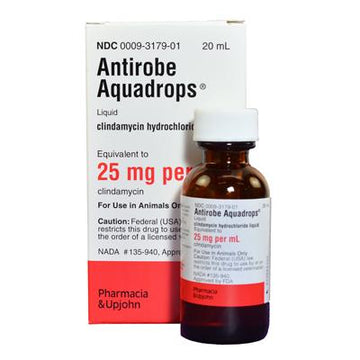
Antirobe Aquadrops (Rx)
$13.98 / unit
-
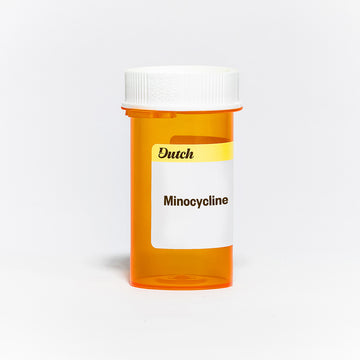
Minocycline (Rx)
$0.26 / unit
Multiple options available
-

Zeniquin Tablets (Rx)
$2.10 / unit
Multiple options available
-
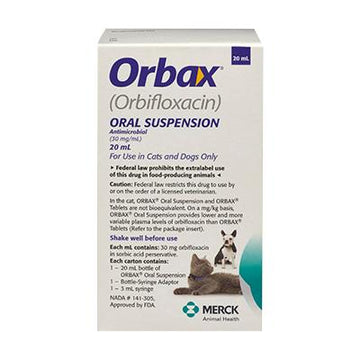
Orbax Suspension (Rx)
$60.09 / unit
-

Erythromycin 2% Topical Solution (Rx)
$31.94 / unit
-

Tylan Soluble Powder (Rx)
$87.19 / unit
-

Rilexine (Cephalexin) Chewable Tablets (Rx)
$31.93 / unit
Multiple options available
- 1
- 2
Frequently asked questions
What are antibiotics used to treat?
What are antibiotics used to treat?
Antibiotics treat bacterial infections in humans and animals, helping them recover from various illnesses. They can target infections throughout the body, including the skin, urinary tract, respiratory tract, and gastrointestinal system.
A few of the most well-known antibiotics for dogs include:
- Amoxicillin: This broad-spectrum antibiotic is effective against a wide range of bacterial infections. It’s commonly used to treat urinary tract infections (UTIs), skin infections, and respiratory infections in dogs.
- Metronidazole: Metronidazole is often prescribed to treat infections caused by bacteria and certain parasites. It’s commonly used to treat GI infections, periodontal disease, and certain types of diarrhea in dogs.
- Cephalexin: Cephalexin is another broad-spectrum antibiotic. It’s frequently used to treat skin, urinary tract, and respiratory infections in dogs.
There are also antibiotic creams or ointments for dogs to treat bacterial skin infections. These topical antibiotics are applied directly to the affected area and can be useful for treating localized infections, such as wounds, hot spots, or dermatitis.
Learn more about these antibiotics and more by visiting our online pet pharmacy, where you can get your dog’s meds fulfilled and find new great pet care products that make being a pet parent a little easier.
Can I get dog antibiotics over the counter?
Can I get dog antibiotics over the counter?
No, you can’t get over-the-counter antibiotics for dogs. Antibiotics for dogs are prescription medications that require approval and guidance from your vet. This ensures that the antibiotic is appropriate for your dog’s condition.
Administering any antibiotics or medication without veterinary oversight can be ineffective or potentially harmful to your dog’s health.
How do I get a prescription for dog antibiotics?
How do I get a prescription for dog antibiotics?
Consult a vet with Dutch to determine if your dog needs antibiotics. After assessing your pet’s condition, our licensed veterinarians can diagnose and prescribe a customized treatment plan, such as antibiotics, for your pup. Dutch members get free shipping on pharmacy orders, unlimited follow-ups, and attentive care for their pets.
What are the side effects of antibiotics for dogs?
What are the side effects of antibiotics for dogs?
Antibiotics in dogs can cause a range of side effects, depending on the medication and your dog’s individual responses. Some common side effects include:
- Gastrointestinal upset: Antibiotics have the potential to upset the balance of beneficial bacteria in the gut, which may result in gastrointestinal problems such as diarrhea or vomiting.
- Allergic reactions: Dogs can have allergic reactions to any medication, including antibiotics, which can manifest as itching, hives, facial swelling, or difficulty breathing. While rare, severe allergic reactions can be life-threatening and require immediate veterinary attention.
- Changes in behavior: Some dogs may experience changes in behavior while taking antibiotics, such as lethargy, restlessness, or agitation.
Don’t be afraid to ask your vet questions about any of the medications they prescribe to help you understand what to look for when monitoring your pet. If you notice any adverse reactions while your dog is taking antibiotics, contact your vet immediately for the next steps.
How long do dogs need to take antibiotics?
How long do dogs need to take antibiotics?
How long your dog needs to take antibiotics depends on the type and severity of the bacterial infection, the antibiotic prescribed, and your dog’s overall response to treatment. In general, most antibiotic courses range from 7 to 14 days, although it may be longer for some infections.
Always make sure you complete the full course of antibiotics as prescribed by your veterinarian, even if your dog’s symptoms improve. Stopping treatment early could mean that the infection might not be completely gone, which can lead to recurrence.












